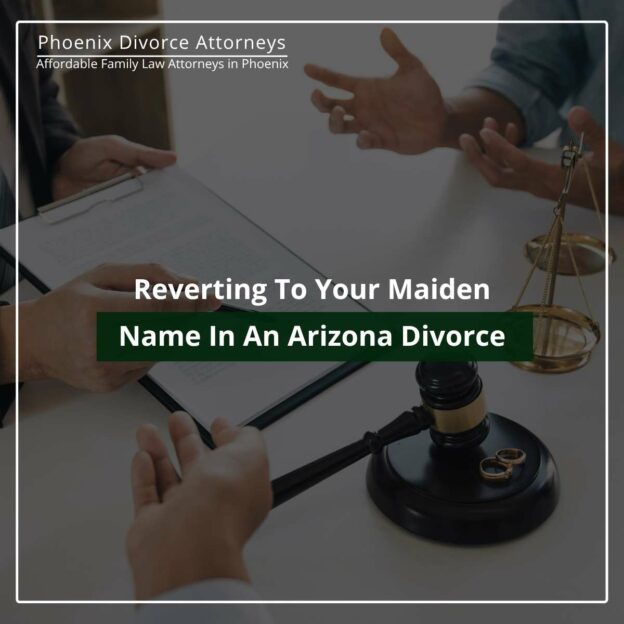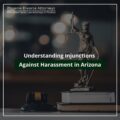Most of us enter a marriage with the intention for that to be relationship to last until parted by death. But life doesn’t always work out that way, and about half of marriages end in divorce. Many wives in Arizona choose to take their husband’s last name when they get married, or hyphenate to combine their husband’s last name with their own maiden name. After divorce, having that constant reminder of your former partner may be stressful and emotionally burdensome. But it can also be complicated to go back to using your maiden name, especially if your legal last name has been your husband’s for several years. Read on to learn more about the factors you should consider when deciding if you should revert to your maiden name after getting divorced. If you’re seeking legal guidance from an experienced Arizona family law attorney, call 602-509-0955 to schedule your free consultation with My AZ Lawyers.
The Inconveniences Of Switching Back
If you have been married for a long time, you’ve probably become quite accustomed to your married last name. Some wives choose not to revert back to their maiden names for a variety of reasons. There is value in having one’s last name match the last names of their children and other family members. It may be a matter of pride for some- why should they have to change their name and change all of their legal documents when they have just as much of a claim to the name at this point as their husband? And simple inconvenience is a major reason that wives who have changed their last names sometimes opt not to change back when they get divorced. Reverting back to their maiden name could mean having to change their name on their driver’s license, passport, bank accounts, etc. This is stressful and could take months to complete- in fact, a wife who changed her name for marriage may never stop receiving communication and mailpieces with her husband’s last name. So Some choose to simply continue using that last name.
One of the first government agencies a wife reverting to her maiden name should notify of her name change is the Social Security Administration. This is done by completing Form SS-5 and including a copy of the divorce decree or court order finalizing the name change. This step is necessary to ensure that federal and state tax returns match the legal name change. She should also inform the MVD so her driver’s license or state ID can be changed to reflect the name change.
A wife who plans to revert to her maiden name can begin using her maiden name at any time she likes, but can’t officially change it on her legal documents until she has a divorce decree finalizing the divorce and the name change. An ex-husband doesn’t need to give his wife permission to revert to her maiden name, nor does she need his permission to continue using his last name after divorce. Things can become more complex for a woman who divorces, reverts to her maiden name, and remarries and takes her new husband’s last name shortly after. Here, if her last name doesn’t match her documents yet, she should use the divorce decree to indicate the legal last name to be used for her remarriage documents.
Having Your Last Name Match Your Birth Certificate
If you changed your name when you got married, your legal last name no longer matches the one listed on your birth certificate. This may have not been a factor you dreamed would become relevant when you made this choice. But thanks to the Trump Administration, it is now extremely important for your last name to match the one on your birth certificate, or it could limit your civil rights. The SAVE Act creates roadblocks to voting for citizens whose IDs don’t match their birth certificates- e.g., married women. Trump’s latest Executive Order, entitled Restoring Equality Of Opportunity And Meritocracy, eliminates protections for women in banking and financial applications, and raises concerns that married women may soon need permission from their husbands to open a bank account, apply for a loan, etc. This factor shouldn’t be ignored in the decision of whether to revert to your maiden name in divorce.
The Two Methods To Change Your Last Name After Divorce
There are two ways you can change your last name after divorce: through a divorce decree or a court order. Generally, changing your name through the divorce decree is a simpler process than doing so by court order. No matter which state you live in, there should be an option on your divorce decree to revert back to your maiden name if you changed your last name upon getting married. This will cause your name to automatically be legally changed back to your previous name or birth name when the divorce is finalized. If you failed to select this option with your initial filing, you may be able to file a motion requesting the court to modify your decree and allow you to revert to your previous last name. Otherwise, your remaining option will be to change your last name through a court order.
Reverting To Your Maiden Name While Still Married/Through A Court Order
Whether it’s family ties, the current political climate, or any other reason, you may find yourself wanting to revert to your maiden name while still married to your husband. This is generally allowed, although the court may deny a name change if it appears to be to commit fraud or engage in criminal activity. If it is for cultural reasons, professional reasons, etc., the court will typically allow the name change to proceed. The process starts when the wife files a petition for name change with the court and pays the filing fee. A spouse seeking to revert to their maiden name while still married should have available their marriage certificate, government-issued photo ID, birth certificate, and any business licenses, published works, etc. showing professional cause for the name change. Some states require that the other spouse be notified of the name change request. Here, the spouse can object to the name change, although an objection doesn’t guarantee that the court will deny the name change. If the court denies the request based on an error in the petition or missing evidence, the spouse can amend their request and re-file it with the court. If a spouse seeks to appeal the court’s decision on their name change request, it can be beneficial for them to seek legal counsel from an experienced attorney.
The process of changing one’s last name through a court order is risky and more complicated than doing so through a divorce decree. If you are at the beginning of the divorce process, you may still be unsure about whether you want to revert to your maiden name. If you need help weighing the pros and cons of this decision with an experienced Arizona divorce lawyer, call 602-509-0955 to schedule your free consultation with our firm.
Get Your Arizona Divorce Questions Answered By An Experienced Family Law Lawyer
Whether you’re getting divorced or simply want to revert to your maiden name, making decisions in family law matters is never easy. But you shouldn’t be intimidated from pursuing your goals due to legal complexity and worries about up-front costs. At My AZ Lawyers, our dedicated family law team can review your case and identify the most effective legal strategies that have worked for countless clients like you. Your initial consultation by phone is 100% risk-free. Schedule your free consultation with an experienced member of our Arizona divorce law firm today by calling 602-509-0955.






